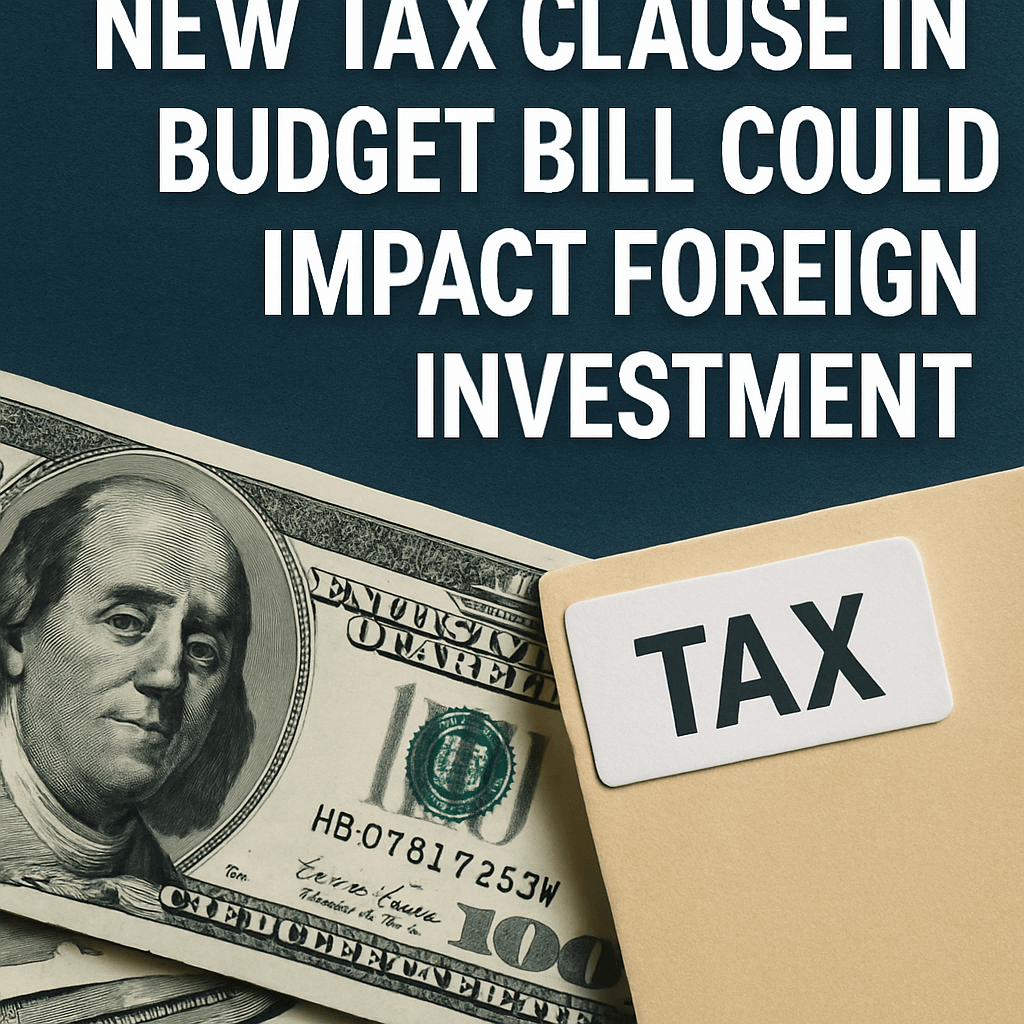New Tax Clause in Budget Bill Could Impact Foreign Investment

A clause recently included in President Trump’s latest budget bill, identified as Section 899, poses significant implications for both the markets and US industries, according to Nigel Green, CEO of deVere Group, a leading independent financial advisory and asset management organization.
Understanding Section 899
Passed by the House of Representatives, Section 899 grants the US government enhanced authority to impose higher taxes on businesses and investors linked to countries that are characterized as having hostile or discriminatory tax practices. This measure extends beyond American companies that operate internationally; it envelops foreign investors in US equities and corporate bonds, drastically broadening its impact.
Implications for Foreign Investment
Green contends that this measure jeopardizes investor confidence and may lead to a significant withdrawal of foreign capital at a time when the US economy is heavily reliant on such investments.
“It punishes the very people whose capital keeps American businesses growing, whose investments fund US debt, and whose companies are employing millions of US workers,” Green states. “If Washington wants to repel foreign investment into America, this is exactly how to do it.”
The Removal of Tax Exemptions
Further complicating the issue, Section 899 eliminates long-standing tax exemptions that sovereign wealth funds have enjoyed. These funds represent a vital pool of capital for US infrastructure and innovation sectors, and their withdrawal could hinder significant projects and advancements in technology.
Current Trends in Foreign Investment
Recent data from the US Treasury illustrates a concerning trend: foreign investors are pulling back from US Treasuries and equities. Cumulative holdings in US government bonds have experienced a notable decline over the past year, aligning with a time of unprecedented debt issuance by the US government. With the nation’s deficit soaring, the need for foreign capital is now more pronounced. Green warns that with legislation like Section 899, the US is effectively discouraging foreign investors from maintaining their investments in the country.
Impact on US Employment and Competitiveness
Foreign multinationals contribute significantly to employment across various sectors, particularly in automotive, pharmaceuticals, and technology. These industries have traditionally relied on cross-border investment, and the deterrent effect of Section 899 may yield ramifications that extend beyond financial markets.
“This won’t only affect bureaucrats in foreign capitals; it will hit factories in Ohio, research facilities in Texas, and small businesses across the Midwest that depend on international partnerships,” Green emphasizes.
The Risk of Retaliatory Measures
The potential for retaliatory measures from key trading partners raises further concerns. As countries respond to punitive tax measures, investors might encounter tax retaliation or trade frictions, exacerbating the already fragile global economic landscape.
The Strategic Disconnect
Green argues that this new tax clause is fundamentally at odds with the administration’s purported goals of job creation, reindustrialization, and boosting US manufacturing attractiveness. He points out that investment does not occur in isolation—it flows to environments perceived as welcoming.
“If the US signals it’s turning inward and becoming hostile to foreign capital, investment will redirect to more favorable locations,” Green warns.
Call for Reconsideration
In light of these developments, Green advocates for a swift reevaluation of Section 899 to forestall its enactment into law. He underscores the historical significance of America’s openness to global enterprise and investment, contending that this tax measure sends a contradictory message that could reverse decades of economic progress.
“The consequences won’t be merely theoretical—they will be felt in job markets, property values, and capital costs,” he concludes.
Conclusion
As the implications of Section 899 become clearer, it is evident that the legislation could reshape the landscape of foreign investment in the United States. Stakeholders from various sectors will need to navigate this evolving environment carefully, assessing risk and opportunity as the potential repercussions unfold.
Source: diyinvestor